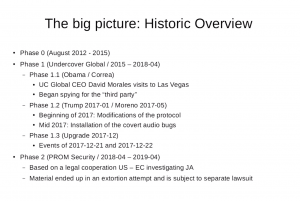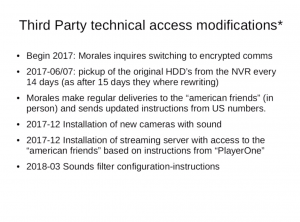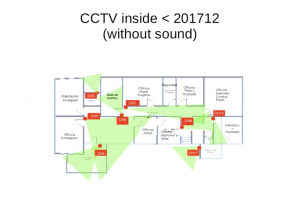Hot and Cold Running Mike Pompeo and Other Ridiculous WikiLeaks Defense Claims
Today is the first day of Julian Assange’s fight to avoid extradition. In addition to legitimate First Amendment concerns about extraditing Assange on the charges as written, Assange is challenging the extradition with some very selective story-telling to pretend that he’s being prosecuted for political reasons.
For example, WikiLeaks is pointing to the Dana Rohrabacher pardon discussion in August 2017 to suggest that Trump was extorting Assange, demanding he provide certain details about the 2016 hack (details that are consistent with the lies that Assange told consistently about Russia’s role in the hack-and-leak) or else he would prosecute him. Unsurprisingly, WikiLeaks did not mention that discussions of a pardon started at least as early as December 2016 as payback for his role in the election, and continued in February 2017 as Assange tried to use the Vault 7 files to extort a pardon. If you can believe Roger Stone, pardon discussions continued even after DOJ first charged Assange in December 2017until early January 2018 (though that may have been an attempt to silence Randy Credico and thereby keep details of what really happened in 2016 secret).
WikiLeaks is also misrepresenting the timing of the increased surveillance by UC Global in December 2017 to suggest Assange was always being surveilled that heavily.
I will pass over the intervening period during which Julian Assange continued to have his conversations with his lawyers and family constantly monitored and recorded by a private agency acting on the instructions of US intelligence and for their benefit.
As slides from Andrew Müller-Maguhn make clear, the surveillance only began to really ratchet up in December 2017, after Assange had helped Joshua Schulte burn CIA to the ground (and at a time when WikiLeaks remained in communication with Schulte).
Assange’s team then mis-states when Trump’s war on journalists began, suggesting it preceded the April 2017 targeting of Assange, rather than came in August 2017.
That temporal slight is necessary because Assange’s team is claiming that Mike Pompeo decided to attack WikiLeaks in April 2017 out of the blue, out of some kind of retaliation.
That is why the prosecution of Mr. Assange, based on no new evidence, was now pursued and advocated by the Trump administration, led by spokesman such as Mike Pompeo of the CIA and Attorney General Sessions. They began by denouncing him in April 2017. I refer you to the following:
i. Firstly, the statements of Mr. Pompeo, as director of the CIA, on 13 April 2017, denouncing Julian Assange and WikiLeaks as “a non-state hostile intelligence agency“. [Feldstein, tab 18, p19 and K10] On the same occasion, Pompeo also stated that Julian Assange as a foreigner had no First Amendment rights (See Guardian article, bundle K)
ii. Then there was the political statement of Attorney General Sessions on 20 April 2017 that the arrest of Julian Assange was now a priority and that ‘if a case can be made, we will seek to put some people in jail‘ [Feldstein quoting Washington Post article of Ellen Nakashima, tab 18, at page 19]
That’s thoroughly absurd. Pompeo’s speech was entirely about CIA’s response to have been burned to the ground by WikiLeaks. This passage makes clear that, in his prepared speech at least, Pompeo’s comments about the First Amendment don’t pertain to him being a foreigner at all (I’m going to pull the video).
No, Julian Assange and his kind are not the slightest bit interested in improving civil liberties or enhancing personal freedom. They have pretended that America’s First Amendment freedoms shield them from justice. They may have believed that, but they are wrong.
[snip]
Third, we have to recognize that we can no longer allow Assange and his colleagues the latitude to use free speech values against us. To give them the space to crush us with misappropriated secrets is a perversion of what our great Constitution stands for. It ends now.
Here’s what he said in questions:
DIRECTOR POMPEO: Yeah, First Amendment freedoms. What I was speaking to there was, as – was a little less constitutional law and a lot more of a philosophical understanding. Julian Assange has no First Amendment freedoms. He’s sitting in an embassy in London. He’s not a U.S. citizen. So I wasn’t speaking to our Constitution.
What I was speaking to is an understanding that these are not reporters don’t good work to try to keep you – the American government honest. These are people who are actively recruiting agents to steal American secrets with the sole intent of destroying the American way of life. That is fundamentally different than a First Amendment activity, as I understand them, and I think as most Americans understand them. So that’s what I was really getting to.
We’ve had administrations before that have been squeamish about going after these folks under some concept of this right-to-publish. No one has the right to actively engage in the threat of secrets from America with the intent to do harm to it.
Mike Pompeo is and always will be a problematic figure to make this argument.
But all the evidence shows that Assange’s surveillance and prosecution arose in response to the Vault 7 leaks, not Trump innate hatred for journalists.
Update: Here are the Prosecution’s Opening Statement and Skeleton Argument.




